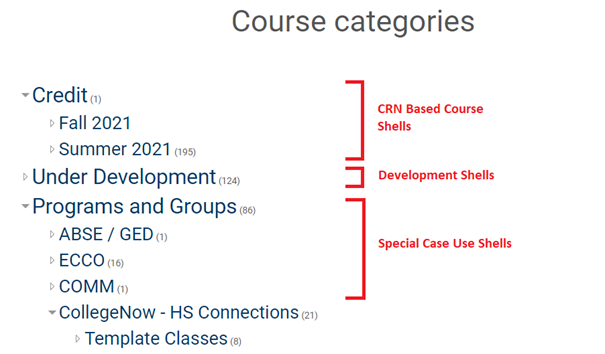Table of Contents
What are “shells”?Production courses versus development coursesCourse CategoriesCRN coursesDevelopment shellsWhat are the uses?Do they ever expire or get archived?Development shells have longer active life spans over CRN course shells.How do I get a development shell?Contact Academic TechnologyWhat are “shells”?
We use the term “shell” to talk about each individual instance or digital container an instructor is given to upload content into. Typically, Moodle shells contain a single course but not always (i.e. shared resources, multi-class “homeroom”, single activity, materials for multiple courses). A teacher may have three versions of a course (three separate “shells” but one “course” - full credit, Half credit, and summer school shells) so early Moodle experts started using a different term to improve clarity. It can be confusing for new users as Moodle support often uses the term “shell” and “course” synonymously.
Production courses versus development courses
- Production (PROD) courses, more commonly known as official College CRN (course reference number) associated classes. Empty CRN course shells are automatically created, matched to the college's official CRN and enrollment, and distributed to instructors each term.
- Development (DEV) shells provide a digital space that instructors can utilize for:
- a specific course
- multiple courses
- shared resources for other courses
- template content
- previously delivered course archive
Course Categories
- CRN based course shells (production) exist in the category and subcategories of “Credit”.
- Special case use shells (production) are classes and program pages that do not have a CRN but host materials or workshops for students to actively view and access. These are held in the “Programs and Groups” category and it’s subcategories. Enrollment is not automatic for any course that falls into this category. If you think you might need one of these courses contact the ATC to find out if it’s right for you.
- Course development shells under the “Under development” category holds all development shells.

You can view the category a course is assigned within your “Edit course settings” page.

CRN courses
These are the shells that get released to instructors prior to every term automatically. CRN courses include the 5 digit course code in the name in Moodle and automatically get student enrollments from the class list in banner before the term starts. See this calendar for course creation and enrollment timelines to find out when courses get created, instructors get access, and students get added to the courses!
Development shells
A development shell is a Moodle course that does not have a CRN, has no student enrollments from registration, and acts as a sandbox or development space for using and practicing with Moodle features and/or building a future courses you may have coming up.
What are the uses?
As mentioned above you can use them to build up your future courses to reduce the need to rush last minute or just plan ahead if you think you will be teaching a specific course in the future. Some other uses are:
- Update due dates for the next upcoming term’s course before official CRN shells are released to instructors.
- Build or fix quiz questions for future terms.
- Construct and plan a new course you have coming up with more time than you would you waited for official CRN shells to come out.
- Make changes and fixes to a development shell version that cannot be applied to the current term. Example: There was a gradebook problem where you may want to fix it in the current course but you want to apply the change so you don’t forget to later. You can apply it to your development shell version of that course.
- Plan and new assignments or resource materials for courses you already have.
Do they ever expire or get archived?
Eventually — Yes. If a development course is not accessed for 3-4 years, it’ll be placed on a course archive list and eventually removed. Once a course is triggered for archiving, you will be notified by email and can take action to delay archiving by making an edit inside the course. If a development shell is archived and removed, you can always request it get brought back in the future (up to 10 years depending on course compatibility).
Development shells have longer active life spans over CRN course shells.
With this in mind having a development shell allows you to keep a copy of a course you teach long term since the archive process for these classes happens infrequently and only to those courses you are not actively accessing. This allows you to continually work in and improve your courses before you ever need to teach them again.
How do I get a development shell?
Send a request to the ATC over email(atc@lanecc.edu) and we can get one created. Send along the desired name for each development course you would like. There is no limit on how many development shells you have so if you teach 10 different courses and you want a development for each just send the request in!
ATC Support & Hours of Operation
Weekday Support, Monday - Friday
- Phone (voicemail only): 541-463-3377 (8am-5pm)
- Email: atc@lanecc.edu (8am-5pm)
- Find our updated hours and support options on the ATC Website
The ATC is open to in-person assistance. Support is available through the above remote options and on campus at CEN 208